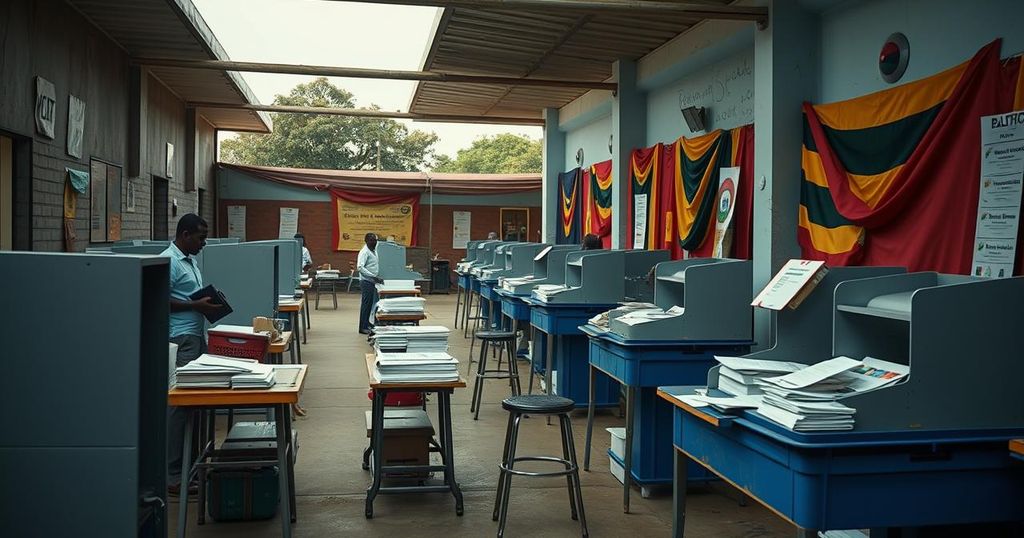Allegations of Election Fraud Emerge in Mozambique

The recent elections in Mozambique have sparked allegations of electoral fraud, primarily from the opposition candidate Venancio Mondlane, who claims widespread malpractices. FRELIMO is expected to secure victory, but Renamo’s diminishing influence raises concerns. Observers note significant irregularities in the voting process, particularly involving non-citizen voters from Zimbabwe, which could challenge the legitimacy of the election results.
The recent elections in Mozambique have been marred by allegations of widespread electoral fraud, particularly from the opposition candidate Venancio Mondlane. Despite the official results not yet being released, the ruling party, the Liberation Front of Mozambique (FRELIMO), is anticipated to secure victory with its candidate Daniel Chapo at the forefront. Mondlane, who ran as an independent after departing from the Renamo party, claims he was subjected to egregious electoral malpractice, stating, “What we are seeing here is election rigging of the highest order” – DW. In the early reports, it appears that Daniel Chapo received approximately 53.68% of the votes in Maputo, whereas Venancio Mondlane secured about 33.84%. However, analysts indicate that Renamo’s influence may be diminishing, as another emerging party, Podemos, is poised to challenge Renamo’s traditional status as the primary opposition. Mohja Almeida, a significant political analyst, noted, “I think we will see a situation where Renamo is no longer the second-largest political force and will fall to third place. That would be a significant change in our country’s political landscape” – DW. In addition to claims by Mondlane, Renamo has alleged that the electoral process in Zambezia was compromised, asserting that its observers were barred from monitoring the vote counts. Manuel de Araujo, Renamo’s candidate for Governor of Zambezia, expressed concerns about the disorganization of the electoral process, highlighting that many potential voters were disenfranchised due to their names being removed from voter rolls. Furthermore, the elections prompted significant international scrutiny regarding irregularities, particularly in Zimbabwe where non-Mozambican citizens reportedly participated in the voting process. Allegations arose of collaboration between elements of Zimbabwe’s ruling party, the Zanu-PF, and FRELIMO, as doubts were raised concerning the legitimacy of the votes cast by individuals lacking Mozambican citizenship. The Mirror Masvingo published testimonies about this matter, indicating a troubling trend of cross-border electoral manipulation.
The political landscape in Mozambique has been dominated by the FRELIMO party, which has held power since the country gained independence nearly five decades ago. Recent elections were anticipated to be competitive, particularly with the emergence of independent candidates and other political parties. The historic context includes a violent civil war between FRELIMO and Renamo, which makes the current allegations of electoral fraud especially significant as they threaten to destabilize long-standing political dynamics. Observations from analysts suggest Renamo may be losing its status as the primary opposition, exacerbating tensions surrounding electoral integrity. The role of external actors, particularly Zimbabwe, raises further questions about the validity of the electoral process in Mozambique.
The unfolding events surrounding the Mozambique elections underscore serious allegations of fraud and irregularities that could have profound implications for the country’s democratic integrity. Opposition figures like Venancio Mondlane have publicly decried these actions, claiming a systematic effort to undermine their candidacies. If substantiated, these allegations may challenge the legitimacy of the ruling party’s victory and disrupt the political status quo, paving the way for potential changes in the opposition landscape. The international community must closely monitor developments to ensure accountability and uphold democratic principles.
Original Source: www.dw.com








